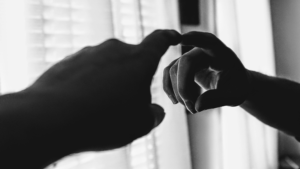By John Will
There is a moment of pure denial.
“My child has what?” Your mind is racing, your heart pounding so loudly in your ears that it drowns out everything else. The person sitting across from you is wearing a white coat, and a pitying smile.
“Your child has a disorder of the corpus callosum (DCC),” says the well-meaning physician. “Here are some of the possible outcomes.” You are handed a thick stack of paper.
“What does it mean?”
“You child will likely never speak, and may never walk, and possibly never sit up or feed herself,” says the white coat. “You may want to start considering options.”
“What do you mean options?”
“Well, given the very low quality of life that your child will have, perhaps you might want to consider alternatives,” says the doctor.
—–
There is a moment of defeat.
“Do you think he will ever be able to go camping?”
“I don’t know. Do you think he will be able to give me a hug?”
“Do you think he will know us?”
Two pairs of eyes stare at each other and look away, afraid that looking too long will confirm worst fears. Heads turn, eyes stare at walls.
“What do we do if he can’t feed himself?”
“How do we tell everyone?”
“What if nothing is ever ok?”
—–
There is a moment of stern resolve.
“I don’t care if she takes longer than her peers, I just want her to have the best life possible.”
“Maybe I should quit my job so we can focus on therapy.”
“I’ll start calling around to find therapists.”
“Have you heard back from the neurologist yet?”
“We are scheduled for a meeting next week. Also, I found some groups on Facebook that look like they can help.”
“What kind?”
“Support groups—that kind of thing.”
“What are the groups saying?”
“The outcomes vary, but generally, everyone seems hopeful and helpful. Oh, and most people commented that the information on the internet is badly outdated and worthless—someone gave me links to current information.”
“Yeah?”
“I found out that there’s even an organization dedicating to supporting families and helping those with a DCC.”
“No way. I thought this was too rare.”
“I guess not. Seems like people all over the place are involved.”
“Any good advice?”
“Yeah, stay on top of doctors and therapies, and reach out to the community for support.”
“And you said that lots of people are in these groups?”
“Apparently. And there are even some folks downtown who are in the group.”
“What was that?”
“Sounded like she was crying.”
“Is it really time for her to get up from nap already?”
—–
There is a moment of pure elation.
“He sat by himself unassisted this morning after you left.”
“What?!? He did?!?”
“And then he smiled at me.”
Eyes meet for the first time in months. A shy smile forms. A single tear wells up.
“What was it like?”
“Like heaven come to earth. Like angels dancing. Like every dream I’ve ever had. Like coming home.”
“I can’t believe I missed it.”
“Not for long—look, he’s smiling again.”
—–
There is a moment of crushing exhaustion.
“Again? Really? I thought we went over that yesterday.”
“We did. And this morning, too.”
“What are we going to do? I feel like every step forward is followed by two back.”
Hands massage eyes and temples. Unbearable weight settles on shoulders. A loud sigh—followed by a yawn.
“She’ll get there, I know it.”
“How do you know?”
“I don’t know. I just hope.”
“Say a prayer for me—I’ve been really discouraged lately.”
“I have been too. We can get through this.”
“I know. I’m just so tired. I feel like everything is taking twice as long as it should.”
“I feel that, too. But remember when she was born?”
“Yeah…”
“Remember that list the doctor gave us?”
“Yeah…”
“Remember when we thought she wouldn’t walk?”
“Yes.”
“Remember when she told you she loves you?”
“You know I replay that moment every day in my mind.”
“Well, that’s why I have faith that she’ll get this, too. Just give her time. She’ll get there.”
“She’s so lucky to have you.”
“You’re not too shabby, either, you know.”
—–
 There is a moment of complete gratitude.
There is a moment of complete gratitude.
“I met a new parent on the support group today.”
“Really? How’d that go?”
“He was extremely nervous. Hopeful, but nervous.”
“What did you say?”
“I told him that the very best thing he could do was to just never give up and always fight for his kid.”
Eyes meet, exchange a knowing glance.
“He thanked me and asked if he can send us any questions he and his wife have.”
“I hope you said, ‘yes.’”
“Of course, you goon.”
“You know, if he didn’t have DCC, we’d never meet people like that.”
“I know. And the thing is, all they need is a little support and encouragement.”
“Remember when the world felt so big and scary?”
“Remember when we felt all alone?”
“Do you know that yesterday, he asked me if we could start a YouTube channel?”
“Really?”
“Yeah, he wants to make videos to show new parents what life with DCC is like so that they don’t have to be scared.”
“You’re kidding me, right?”
“No, that’s exactly what he said.”
“He really is amazing, isn’t he?”
“More and more every day.”
“You know, this isn’t what we planned, but I’m sure glad to be here.”
“Wow, that’s cheesy.”
“I know. I’m a mess whenever I meet new parents.”
“I love that about you.”
“You know, I think maybe we need to work on this.”
“On what?”
“Helping new families.”
“Maybe we can use his YouTube channel to do exactly that.”
“He’d love that. He loves being proof that the doctors were wrong.”
 As the proud father of three children, as well as an MFA graduate and published author, John Will spends his time trying to balance the demands of being a writer and a parent all at once. It’s usually an uphill battle. As the parent of children with special needs, John tries to bring inspiration and hope to his readers. You can find more of John’s work at https://the-writing-dad.com, and https://www.facebook.com/dadswritingadventure.
As the proud father of three children, as well as an MFA graduate and published author, John Will spends his time trying to balance the demands of being a writer and a parent all at once. It’s usually an uphill battle. As the parent of children with special needs, John tries to bring inspiration and hope to his readers. You can find more of John’s work at https://the-writing-dad.com, and https://www.facebook.com/dadswritingadventure.


